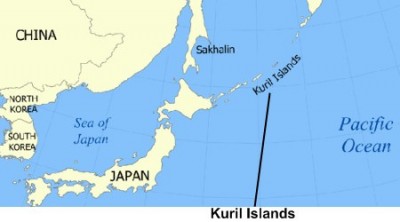Russia Continues Confronting Japan with De Facto Annexation of Disputed Islands

Moscow continues the military reinforcement of the Russian Kuril Islands as well as the de facto annexation of the occupied Japanese islands Iturup, Kunashir, Shikotan and the Habomai Archipelago under the guise of cultural and economic development of what Russia describes as its “South Kuril Islands”.
Russian Defense Minister Sergey Shoigu said on Tuesday that Moscow plans to complete the development of military facilities in the arctic islands as well as “infrastructure developments” in the Kuril Islands in 2016. Shoigu said:
“Basically, it is necessary to complete everything on the islands. Then we proceed to the second stage of the construction and creation of our bases in the Arctic. … This year we should complete the formation of the whole infrastructure on the Kuril Islands.”
Russia is, along with the United States, Canada, Norway and others scrambling for resources in the Arctic as a warmer climate has made both shipping routes and resources in the region accessible. Russia has, as have others, legal territorial claims in the increasingly attractive, although harsh Arctic region.
Moscow’s “cultural development” of what Russian diplomats like to designate as Russia’s “South Kuril Islands“ is, however, legally questionable and disputed by Japan. The so-called South Kuril Islands consist of three islands located in the North of Japan, or the southwestern extremity of the Kuril Islands, as Moscow designated the disputed territory. They include the islands of Kunashir, Iturup, Shikotan as well as the Habomai archipelago.
In August 2015 the otherwise skillful Russian Foreign Minister Sergey Lavrov displayed what was widely perceived as an unusual display of arrogance and victor’s justice when he commented on the Japanese government’s objections about Russia’s “social and cultural development” of the occupied territories, saying:
“Unacceptable comments from Japan on the trips by Russian government officials to the Southern Kuril Islands have come again recently. … We would like to recall we do not plan taking account of the Japanese government members’ opinions as we arrange the itineraries for members of the government. These trips, including the one that government officials make as part of a federal program for social and economic development of the Kuril Islands (the Sakhalin region), will continue. … We are compelled to state that the Japanese side is again demonstrating overtly its negligence of the commonly recognized results of World War II as it multiplies publicly its ungrounded claims to the Southern Kuril Islands. … Such actions look particularly deplorable on the background of the forthcoming 70th anniversary since the end of World War II.”
It is noteworthy that Russia, 70 years after the end of WW II still has not signed a peace treaty with Japan and that Moscow continues dragging its feet in that regard. Several independent analysts noted that Moscow uses the prospect of a peace treaty – or lack thereof – to blackmail Japan rather than settling the dispute legally and in accordance with intentional and human rights law.
Japan does not recognize the Russian occupation or annexation of what Tokyo describes as Japan’s northern territories. Tokyo considers Moscow’s so-called program for social and economic development as an attempt to change the demographics and to lay the foundations for a permanent, arguably illegal annexation.
Dr. Christof Lehmann is the founder and editor of nsnbc. He is a psychologist and independent political consultant on conflict and conflict resolution and a wide range of other political issues. His work with traumatized victims of conflict has led him to also pursue the work as political consultant. He is a lifelong activist for peace and justice, human rights, Palestinians rights to self-determination in Palestine, and he is working on the establishment of international institutions for the prosecution of all war crimes, also those committed by privileged nations. On 28 August 2011 he started his blog nsnbc, appalled by misrepresentations of the aggression against Libya and Syria. In March 2013 he turned nsnbc into a daily, independent, international on-line newspaper. He can be contacted at nsnbc international at [email protected]


